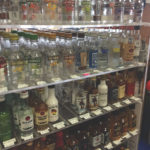EASTHAM — At any beach cleanup, the haul of trash is fairly predictable: plastic, in the form of beverage bottles, shopping bags, straws, netting, and more. Because much of the litter on beaches and roadsides involves purchases from retail stores (and single-use plastic bags to carry them in), the conservation commission is backing two bylaws to outlaw sales of these items.
The ConCom acted to follow up on last May’s town meeting, where voters approved two petitioned articles banning single-use plastic bags and polystyrene.
The select board will vote on Feb. 3 whether to put a plastic bottle bylaw and a plastic and marine hazards reduction bylaw on the warrant for this year’s town meeting, to be held on Monday, May 4. The bottle bylaw would prohibit retail stores in Eastham from selling or distributing beverages and soft drinks in plastic bottles of less than 34 ounces. The sale of distilled spirits in 50-ml plastic bottles (“nips”) would also be outlawed.
The marine hazards bylaw would require stores to phase out single-use plastic checkout bags and require stores and restaurants to stop using, selling, or distributing plastic straws and disposable polystyrene containers and cutlery.
So far 122 municipalities in Massachusetts have enacted some version of a ban on plastic checkout bags.
Stores that supply checkout bags would be restricted to reusable, recyclable, or compostable ones and would have to charge at least 10 cents per bag.
The bylaw would not apply to polystyrene packing peanuts and foam packaging reused from shipments coming to Eastham, prepackaged meat and produce trays, egg cartons, or similar containers bought from a wholesaler or out-of-town supplier, or polystyrene foam freezer chests enclosed in durable rigid plastic.
The bylaw would also ban the sale, distribution, and intentional release of helium-filled balloons in town, except by government agencies or researchers.
Karen Strauss, a member of the conservation commission, said that even though many establishments in town offer paper bags instead of plastic, that is also a problem.
“Paper bags have their own issues,” Strauss wrote in a document on the bylaw proposal. “Chemical fertilizers are often used on the trees grown for wood pulp…. Paper bags are heavy, and transport requires the use of petroleum. Paper bags, like most other things, are seldom recycled, and end up as solid waste.”
Some local businesspeople were less than pleased. Leslie Plumb, owner of Town Center Wine & Spirits, said there has been little communication from the town about the proposed bylaws.
“It’s so anti-business,” Plumb said. “There’s so many unintended consequences with this.”

She said the volume of nip sales was significant and that if the store had to stop selling them she would have to lay off at least one employee. “We would be in survival mode,” she said. She also claimed that many buyers of nip bottles dispose of them responsibly.
“As a business we absolutely do support the environment and conservation,” Plumb said. “All of our cardboard and all of our paper bags are recycled. If the town supplied signs to liquor stores to encourage responsible disposal of nips and increased public trash cans and recycling efforts across town, that might be more effective.”
Rohitkumur Patel, manager of the Village Green General Store, said his business would take a big hit, too.
Strauss said at the ConCom’s Jan.14 meeting that she would provide a chart of alternatives to plastic bottles at a meeting at the Eastham Library on Wednesday, Jan. 29, at 6 p.m.
In an interview, Select Board Chair Aimee Eckman said she agreed with Strauss on the need for the bylaws and that she hoped to make business owners aware of alternatives to plastic.
“Their businesses aren’t going to collapse because of this,” she said.
Alternatives include boxed water, which comes in a carton, like milk, or glass soda and juice bottles. Patel said the alternatives are more expensive and he would have to charge more for them.
“What are you going to do?” he said. “I have to make a profit.”
Sarah Wilcox, owner of Eastham Superette, did not respond to a request for comment. Cumberland Farms management declined to comment for this story.
Patel and Plumb said they had heard about the proposed bylaws only recently. The town sent an email to local businesses about the bylaws on Jan. 13.
“The reasoning behind the petitioned articles and creating these bylaws is due to concern about the increasing amount of plastic found in our environment, the harmful impacts it is causing to sea life, and its inability to degrade over time,” Eckman wrote in the email. “These plastic items were specifically chosen because they are the most frequently collected during beach clean-ups.”
Most plastic nip bottles end up on the ground, she said in the interview. “People throw those things out their car windows,” she said. “They’re just everywhere.”
Penalties for violating either bylaw would be a written warning for the first offense followed by a $200 fine for a second offense and $500 fine for third and subsequent offenses.
Plumb said she feared a loss of business: patrons will just go to Orleans or Wellfleet to buy nips and other drinks in plastic. While they’re there, they may do the rest of their shopping, thus driving business away from Eastham.
Citizens may submit comments to the select board at its Monday, Feb. 3 meeting at 5:30 p.m. at town hall.



